 ★★★½
★★★½
“Sympathy for the devil.”
Alright, this needs some background first, so I’ll try my best to give the necessary information. Date a Bullet is a two-part spin-off movie from Date a Live. This was originally a light novel series, that became a manga and then an anime series. The last-named started in 2013 and is currently in its fourth season: it also previously got a pair of OVAs and one movie. This is the second film, though is essentially two episodes that were put together, and released in cinemas as a movie, despite a very short length of 50 minutes.
Date a Live was (and still is) as bonkers a basic premise as anime shows can be. A catastrophe 30 years ago causes spirits to appear in our world – until now, always in the form of beautiful girls. What are the odds? If the spirit is stressed or aggravated, she causes earthquakes and natural disasters. A little advice from me: how about the defense services NOT attack at the very first sight of such a spirit? Just an idea… A secret organisation protecting mankind from them has figured out a new way of dealing with these girls. The young, naive student Shido has to approach them, built up confidence and go on a date with them. When he kisses them he “seals in” their powers by doing so. This usually results in the spirit stopping being dangerous and moving into Shido’s home (where are his parents?). For the remainder of the episodes he is busy, trying to cope with school, the emotional needs of the girls and cooking for them all.
I guess there’s something that show wants to teach young Japanese men how to deal with girls. The whole secret organisation’s spaceship team (lead by Shido’s younger sister?) is trying to figure out the best of three responses for Shido when talking to the girls, and usually chooses the worst possible. Hilarity ensues. But somehow I couldn’t feel anything for Shido except for pity, dealing with all these girls wanting so many different things from him. It can’t be easy to be one of those beloved students in what we call nowadays a “harem anime”. There are plenty more of these where this comes from! The show is based on the idea of a so-called dating-app or game that helps train your dating skills before going into the wild, where untamed femininity can overwhelm an innocent, anxious Japanese boy. The idea is not the worst: I could have used such a tool when I was younger!
But this is a different beast, because it deals with the extraordinary character of Kurumi Tokisaki (Sanada), who is really different to all the other girls Shido met in the main show. Usually, meeting a girl spirit meant that, to cut a long story short, Shido would kiss the girl, or she, enchanted by Shido’s friendliness would kiss him – it has to be voluntarily. She’d join his harem, while they all crave his attention, everyone wanting a piece of him, his time, physical contact and so on. Not Kurumi. When she first appeared in the show, she seemed the girl spirit of this half-season, so to speak, but then quickly turned the tables.
 While the other girls might be complicated and have problems, like feeling unloved, being shy and, in one case, not even being into men, there always was a solution. Kurumi is… different: Shido soon found out she was there to sexually arouse him, so she could “eat him”. We can argue about the not-so subtle subtext: male Japanese anxiety about a sexually demanding and active woman. In the very same episode, some boys make sexually charged comments about her, she lures them into the shadows… next the blood is dripping from the walls.
While the other girls might be complicated and have problems, like feeling unloved, being shy and, in one case, not even being into men, there always was a solution. Kurumi is… different: Shido soon found out she was there to sexually arouse him, so she could “eat him”. We can argue about the not-so subtle subtext: male Japanese anxiety about a sexually demanding and active woman. In the very same episode, some boys make sexually charged comments about her, she lures them into the shadows… next the blood is dripping from the walls.
Yeah, cute-looking Kurumi in sexy red-black lingerie is a killer, a femme fatale and if I’m not mistaken (correct me if I’m wrong), falls into the popular category of the “yangires”, female psychotic anime characters that can go on a bloody rampage at the slightest provocation. She is the killer shark among Shido’s girl. But then, she never becomes part of his actual haremm because they never kissed. Innocent Shido would have been dead meat. There may be a hint of Kurumi being abused in her former life; it could just be me, trying to read between the lines.
In a show that follows the usual rules of harem anime, a character like this is almost a provocation, riding roughshod over those unwritten rules. Kurumi is a force to be reckoned with. Her left eye features the yellow dial of a clock: with her magical calling of “Zaphkiel”, an angel that can manipulate time and appears as a giant dial, she can actually turn time around. By shooting her gun into her own head she can replicate herself and create as many clones of herself as she wants. Magically she appears to be independent, she can appear wherever and whenever she wants.
For most of the show she has been the “punch clock villain”, someone you could expect to appear sooner or later in the show. Though she seems to soften her attitude to Shido, after her first encounters with Shido, where he unsuccessfully tried to reason with and find an emotional angle on her – that worked with the other spirits. In one episode, she goes on a date with him, only to be shot by a superior version of herself at the end, This clone was obviously trying to fulfill her supressed romantic desires. In a late season 3 episode, she even helped him travel back in time to prevent a catastrophe that would send one of his girlfriends on a later revenge trip against the other girl spirits.
Okay. On to Date a Bullet , which is exceptional in the Date a Live universe as it tells a story with Kurumi as the main character. There’s no Shido to be found here, none of the harem girls or supporting characters appear, It’s as if you took a bad Bond girl and gave her a solo movie. So, quite unusual! So, what’s the story? Kurumi finds herself in an alternate world where she is told she is in a battle royale. The winner gets a wish, and might even be able to return to her own world. As she is being told by a small girl who functions as comic relief, that the combatants are all “half-spirits”, Kurumi in her no non-sense manner declares her in quite clear terms that she considers herself a full spirit, not a half one. Then there is the character of the White Queen, an especially dangerous ghost she will sooner or later have to face.
The movie is well-made, though the DVD is definitely too expensive for just ran 50 minutes. It’s entertaining enough, though as expected, too short to build up much tension. But it also serves mainly to show that Kurumi has a heart, too. Flashbacks show a younger Kurumi when she was alive and in school with the one friend she had, Sawa Yamauchi, dreaming of how it will be when she will have a boyfriend. While you can easily guess who the White Queen is, Kurumi shows during the story how tough and no-nonsense she is. She is thankful for help, but this doesn’t mean she’s so naive as to trust you immediately. She has a softer side, too, saving a little cat that plays a special role in the story, and at the end seems to have found a pet that might accompany her in future. Though why she killed her best friend in the past, remains unanswered.
The film helped understand the character a bit better and gave her the limelight she deserves. I wouldn’t say we know everything about Kurumi Tokisaki now though. The character stays interesting and as Date a Live with its funny situations and cute/sexy girls is something of a guilty pleasure for me, I look forward for a dubbed version of season four, and discovering what kind of role Kurumi will play in it.
Dir: Jun Nakagawa
Star (voice): Asami Sanada. Asami Seto, Kaede Hondo, Mariya Ise
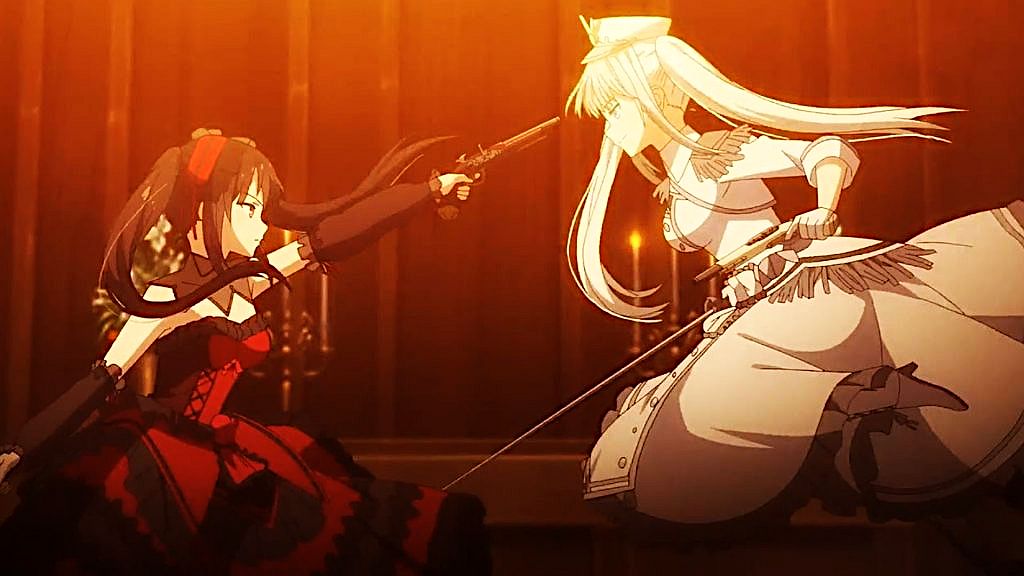
 A decade after the splattery joy which was The Machine Girl, we get this – not quite a sequel, not quite a reboot. Creator Noboru Iguchi helped on the script, but hands the directorial reins over to another, and… Well, it’s amusing and moderately entertaining, rather than the jaw-dropping and ground-breaking spectacle which was the original. Part of this is simply the passage of time: what was fresh and original at the time, has now become much more familiar. There is still no shortage of invention here, but it does seem haphazard. It’s less a story, than a series of skits, albeit ones heavily drenched in gore – unfortunately, a lot from blood group CGI-minus.
A decade after the splattery joy which was The Machine Girl, we get this – not quite a sequel, not quite a reboot. Creator Noboru Iguchi helped on the script, but hands the directorial reins over to another, and… Well, it’s amusing and moderately entertaining, rather than the jaw-dropping and ground-breaking spectacle which was the original. Part of this is simply the passage of time: what was fresh and original at the time, has now become much more familiar. There is still no shortage of invention here, but it does seem haphazard. It’s less a story, than a series of skits, albeit ones heavily drenched in gore – unfortunately, a lot from blood group CGI-minus.




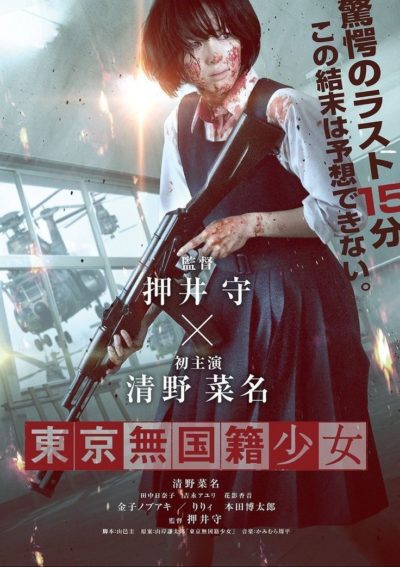 For the first hour, you may be forgiven for wondering if there has been some kind of mistake, because the poster bears almost no resemblance to what happens in the film. Oh, it’s the same actress, to be sure, and she is a schoolgirl. But it appears, rather than the war story promised, you have strayed into a teenage drama. In it, Ai (Seino) is a talented but troubled student, who seems to be suffering from some kind of post-traumatic stress disorder. The special treatment she receives at school brings her enmity as a result, both from her class-mates and the er homeroom teacher (Kaneko). Though she finds solace in art, including a mysterious major project on which she is working, housed in the school auditorium.
For the first hour, you may be forgiven for wondering if there has been some kind of mistake, because the poster bears almost no resemblance to what happens in the film. Oh, it’s the same actress, to be sure, and she is a schoolgirl. But it appears, rather than the war story promised, you have strayed into a teenage drama. In it, Ai (Seino) is a talented but troubled student, who seems to be suffering from some kind of post-traumatic stress disorder. The special treatment she receives at school brings her enmity as a result, both from her class-mates and the er homeroom teacher (Kaneko). Though she finds solace in art, including a mysterious major project on which she is working, housed in the school auditorium.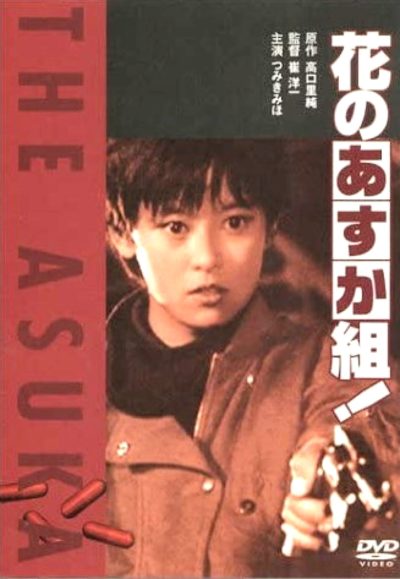 This is based on a 34-volume manga series by Satosumi Takaguchi, which began publication in 1985. It is far from the only adaptation. There have also been two OVAs, a live-action drama series, a different feature version made in 2009, and even a pair of drama CDs. This feature, however, is the only one available in the West to date with subtitles. It takes place at an indeterminate point in the future – the year is given as 199X – when “the streets are overflowing with drugs and violence”. There’s a battle for control, which conveniently seems to be along gender lines. The unfortunately naned male “Red Nose Gods”, under boss Toki Masamune, are going up against the all-girl Hibari Group. They are named after their leader (Mikari), who speaks only through her lieutenant, or with the aid of an artificial voice-box.
This is based on a 34-volume manga series by Satosumi Takaguchi, which began publication in 1985. It is far from the only adaptation. There have also been two OVAs, a live-action drama series, a different feature version made in 2009, and even a pair of drama CDs. This feature, however, is the only one available in the West to date with subtitles. It takes place at an indeterminate point in the future – the year is given as 199X – when “the streets are overflowing with drugs and violence”. There’s a battle for control, which conveniently seems to be along gender lines. The unfortunately naned male “Red Nose Gods”, under boss Toki Masamune, are going up against the all-girl Hibari Group. They are named after their leader (Mikari), who speaks only through her lieutenant, or with the aid of an artificial voice-box.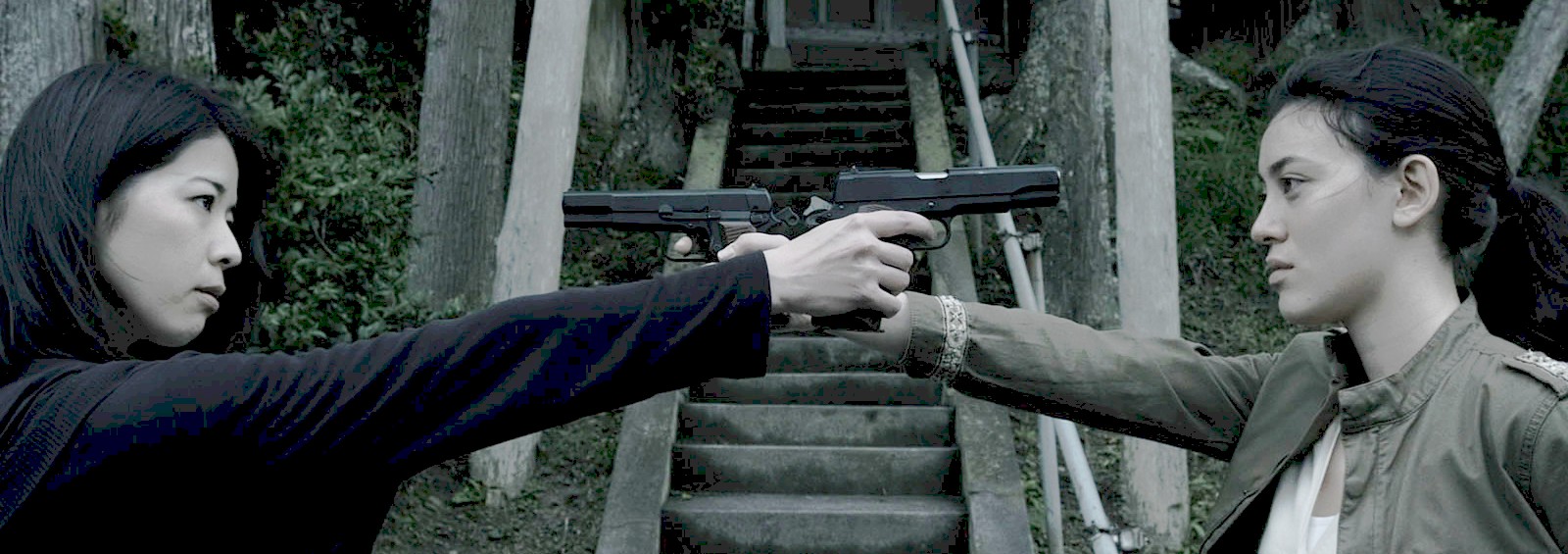 ★★
★★ This is part of the Blood universe, which previously gave us anime series
This is part of the Blood universe, which previously gave us anime series  I have so many questions about the Japanese education system after watching this. It takes place in a high school whose student council is repeatedly being squeezed for extortion money by the Yagyu, a local biker gang. They ride up to the place, beating up and terrorizing the students, and generally making a nuisance of themselves. Where, exactly, is the principal when all this is going on? Teachers? Concerned parents? There is a throwaway line about how reporting things to the police would only make the gang attack harder. But you’d think
I have so many questions about the Japanese education system after watching this. It takes place in a high school whose student council is repeatedly being squeezed for extortion money by the Yagyu, a local biker gang. They ride up to the place, beating up and terrorizing the students, and generally making a nuisance of themselves. Where, exactly, is the principal when all this is going on? Teachers? Concerned parents? There is a throwaway line about how reporting things to the police would only make the gang attack harder. But you’d think  ★★★½
★★★½ While the other girls might be complicated and have problems, like feeling unloved, being shy and, in one case, not even being into men, there always was a solution. Kurumi is… different: Shido soon found out she was there to sexually arouse him, so she could “eat him”. We can argue about the not-so subtle subtext: male Japanese anxiety about a sexually demanding and active woman. In the very same episode, some boys make sexually charged comments about her, she lures them into the shadows… next the blood is dripping from the walls.
While the other girls might be complicated and have problems, like feeling unloved, being shy and, in one case, not even being into men, there always was a solution. Kurumi is… different: Shido soon found out she was there to sexually arouse him, so she could “eat him”. We can argue about the not-so subtle subtext: male Japanese anxiety about a sexually demanding and active woman. In the very same episode, some boys make sexually charged comments about her, she lures them into the shadows… next the blood is dripping from the walls.
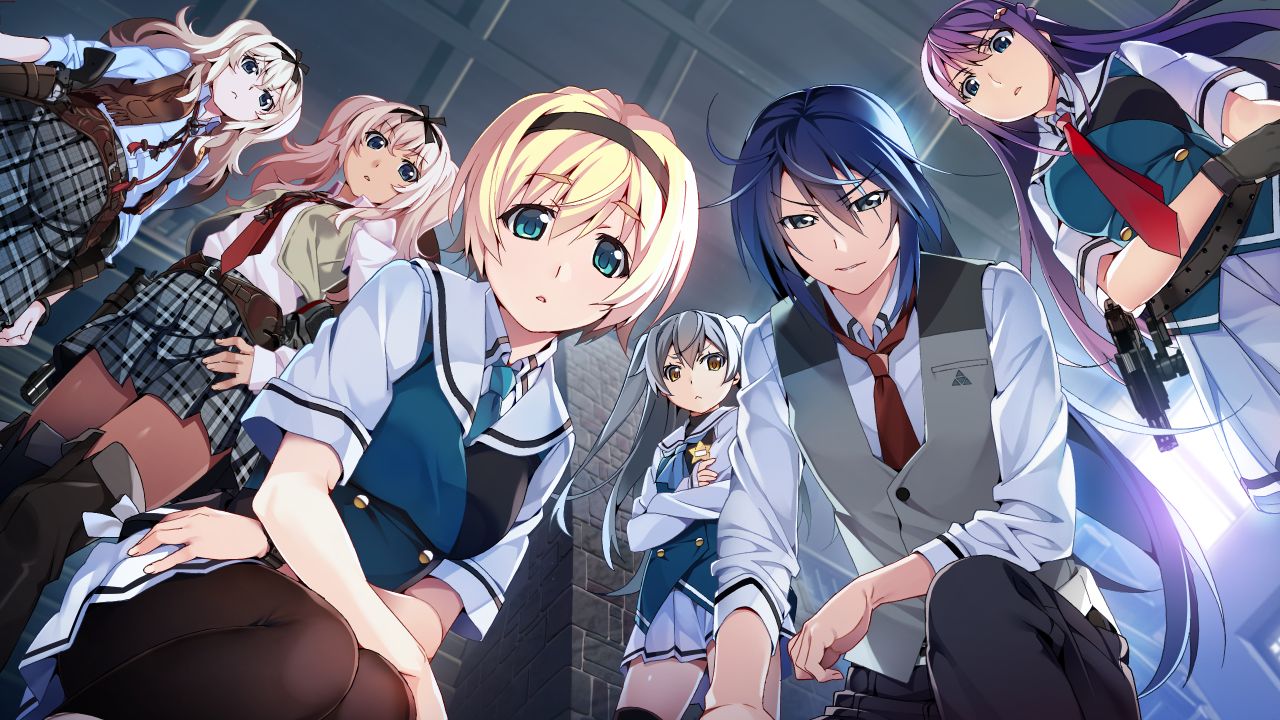 ★★★
★★★ So, what’s it all about? There was a US-Japanese anti-terrorism organisation called CIRS: after having become public knowledge, a new agency for covert operations was created, called SORD (Social Ops, Research and Development). This organisation has established many schools within the country, where homeless poor orphans from unfortunate backgrounds are being trained and schooled to protect the country (meaning: to kill people).
So, what’s it all about? There was a US-Japanese anti-terrorism organisation called CIRS: after having become public knowledge, a new agency for covert operations was created, called SORD (Social Ops, Research and Development). This organisation has established many schools within the country, where homeless poor orphans from unfortunate backgrounds are being trained and schooled to protect the country (meaning: to kill people). Though just 88 minutes long, this is very well done. The few short scenes of the childrens’ childhood give their fight more meaning then the talked about (but never really felt) conflict between for example 007 and 006 in GoldenEye. The fight itself is well-choreographed, looks believable (I’m very well aware I’m talking about an anime!), has exactly the right length and comes across as deliciously hard. And while the whole story about the stolen heart is solved in the end, I liked that this movie doesn’t end the way one would expect. The otherwise trigger-happy Rena
Though just 88 minutes long, this is very well done. The few short scenes of the childrens’ childhood give their fight more meaning then the talked about (but never really felt) conflict between for example 007 and 006 in GoldenEye. The fight itself is well-choreographed, looks believable (I’m very well aware I’m talking about an anime!), has exactly the right length and comes across as deliciously hard. And while the whole story about the stolen heart is solved in the end, I liked that this movie doesn’t end the way one would expect. The otherwise trigger-happy Rena  This is probably a good one and a half stars more than I expected, based on the synopsis and screen shots, which made it seem considerably more like porn with a minor wrestling subplot. Okay, it is not exactly fun for all the family, to put it
This is probably a good one and a half stars more than I expected, based on the synopsis and screen shots, which made it seem considerably more like porn with a minor wrestling subplot. Okay, it is not exactly fun for all the family, to put it  No-one does low-budget hyperviolence like the Japanese. Whether it’s pseudo-snuff like Guinea Pig: Flower of Flesh and Blood, or more fantastical entries such as
No-one does low-budget hyperviolence like the Japanese. Whether it’s pseudo-snuff like Guinea Pig: Flower of Flesh and Blood, or more fantastical entries such as